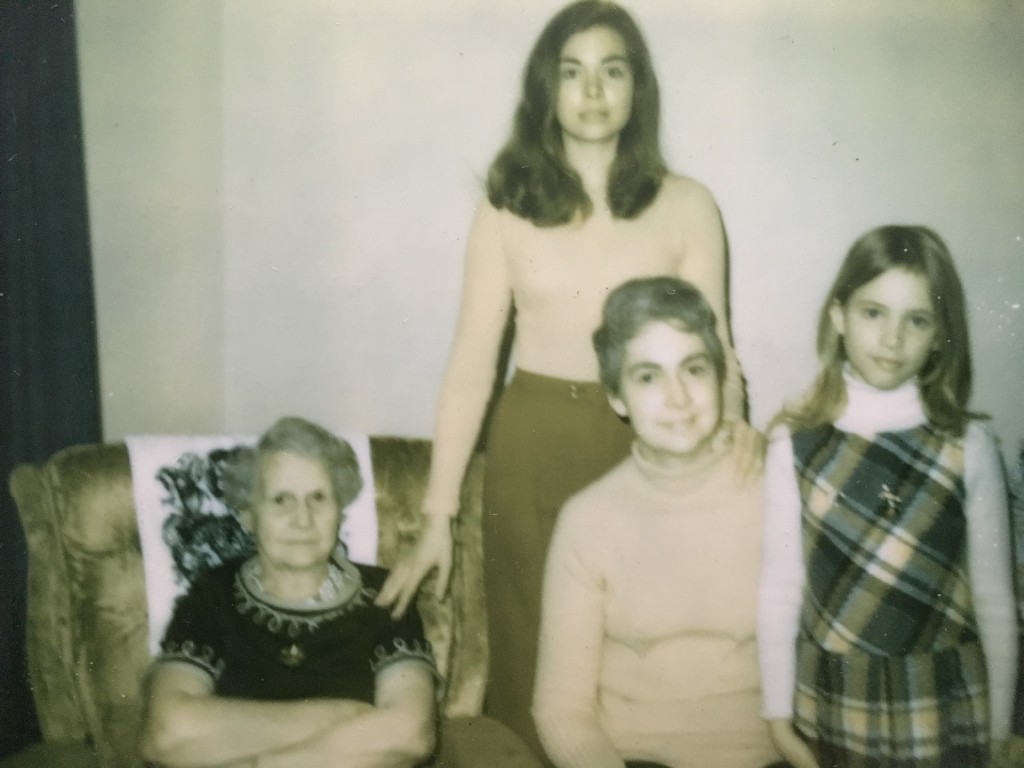Mothers and Daughters
Four generations in one picture.

That’s Velma in the big chair. Arms crossed, stoic caution written on her tired face. She was always old, to me. Old lady hair, soft body shrouded in old lady shifts. Voice of a tentative crone, she would speak when spoken to. Or when delegating. Or calling us to meals. Always tending something, someone. She was somehow joyless, but always kind.
Nana, my mother’s mother’s mother. Matriarch.
She buried three babies and raised six children in the shadow of the wandering dandy she called a husband. The big old house on the dirt lane named for the family is as alive in my memory as she is. The house was her realm, all doilies and polish, cooking and scrubbing. The lilacs and the rabbit hutch, the pony next door and the scary relatives down the lane. I’ll only ever know it — know her — through a child’s eyes. And stories.

That’s Rosemary, daughter of Velma, sitting in the peach sweater, her serene face a lie. Genteel hellraiser, she abandoned her family — a husband and two small children — to run off with a Mexican playboy. She left her kids with Nana, who raised them, and she ran around wild and free in 1940’s America, when such a thing was an unspeakable scandal. She finally brought the playboy back home to live a cloistered life for two, formal visits and holidays with her children an attempted retribution for her crime.
Grandma, my mother’s mother. Black sheep.
She was haughty and tempestuous, a fantasy princess with a peasant’s pedigree. She breathed fire and left ashes in her wake. She broke a full set of fancy china, dropping one piece at a time into the bathtub with dramatic flair. A man once dared to spit at her feet and she beat him with her umbrella. I adored her because she adored me. She showered me with everything a child wants and questioned none of my whims. I was the light in her life, the child she gave away, the chance to make up for her crime. The crime ghosted in my mother’s eyes.

That’s Rosemarie — daughter of Rosemary, granddaughter of Velma — standing in peach. Looking haunted. Or stricken. Angry? Posing? I can never tell. It’s the hands that tell a tale — one on the woman who raised her, the other on the one who should have. I watched her walk that divide and wrestle with loyalty and learn how to mother with only part of the manual.
Mom, with the mother-sized hole in her heart.
She’s beautiful, leaning tragic but always resisting, exhausted by the demands of mothering and the burden of motherlessness. Balancing the solid, silent lessons from her strong grandmother (the woman she called Mama) with the wild, selfish, genetic inheritance of her mother. She has steered herself through a world that defines her by the men and the children in her life. I know her as mother and I know her mother’s story. But can I ever really know her?

That’s me, the child. The girl, obviously pulled from a headlong rush at childhood to stand still for a four-generations photograph. Clearly impatient with the ritual, probably dressed for a holiday. Distracted by things offstage— cousins and small animals, tables loaded with sweets — uninterested in the meaning of the moment. My mother looks filled with the moment, my grandmother looks filled with herself, and Nana just looks resigned. Mothers and daughters, stories and sins. The fraying matrilineal thread running through the generations.
Me. Daughter, granddaughter, great-granddaughter. Mother.
A generation later, I have a mother’s appreciation for the mess of the thing. I’ll not make those mistakes, we say. And yet. Are they mistakes? Or just small navigational errors in a long and difficult journey? Is life just a series of course corrections? My grandmother, Rosemary, used to say after any blunder, “You just pick yourself up and get on down the road.” A convenient mantra for one who left so much wreckage behind.
I love all of the women in that image and I have felt loved by them. But I know each of them only through the prism of their mothering and wonder what’s missing from the picture. What have those women not shared with one another, what are their secrets? Does a measure of blood connect me to their stories? Do the tales we tell about them capture the truth? Do our stories define us?
Will my daughter ever really know me?
Does it matter?